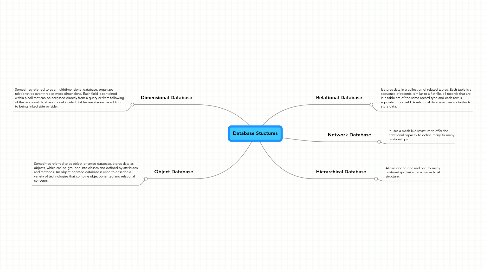Database Stuctures
Jonathan Walkerにより

1. Relational Database
1.1. It stores data in a collection of related tables. Each table is a sequence of records, similar to a flat file, all records that are in a table are of the same record type and each row is equivalent to a field. A relational database uses six tables to store data.
2. Dimensional Database
2.1. Sometimes referred to as a multidimensional database, organizes relationships over three or more dimensions. Each field is contained within a cell that can be accessed directly from a query or from following of the relational database model in which tables are stacked in addition to being linked side by side.
3. Hierarchical Database
3.1. Allows one-to-one and one-to-many relationships, linked in a hierarchical structure.
4. Object Database
4.1. Sometimes referred to as object-oriented database, stores data as objects, which can be grouped into classes and defined by attributes and methods. An object-oriented database is used to describe a variety of technologies that combine object-oriented and relational concepts.
5. Network Database
5.1. It uses a mesh-like structure to offer the additional capacity to define many-to-many relationships.


